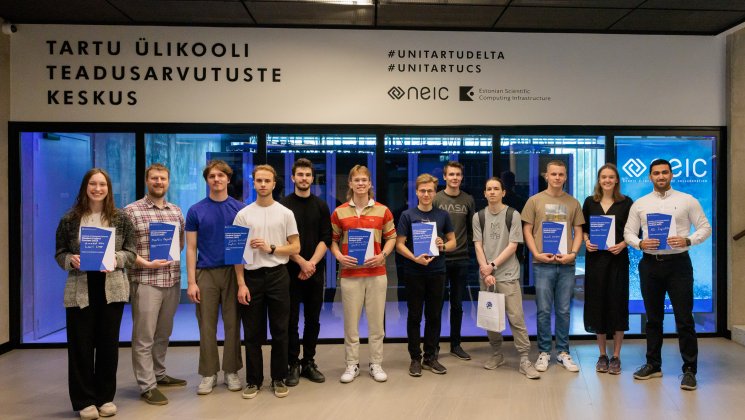Studying abroad
UT Institute of Computer Science has many partner universities in the Erasmus+ programme. Before going to study abroad it is important to coordinate your courses with the program manager, so that your studies abroad would be accounted for in your current curriculum.
You can get acquainted with Erasmus+ partner universities here.
Studying abroad as part of the Master's curriculum in Computer Science
Why study abroad?
Studying abroad or doing your traineeship in a foreign country provides you with invaluable international experience, broadens your horizons, and gives you a strong advantage in the labour market. One of the objectives of our curriculum is to provide students with the basic theoretical knowledge in computer science, as well as the practical skills to apply them. Studying abroad offers an opportunity to acquire extra skills and knowledge in addition to subjects studied at the University of Tartu.
The period, if studying abroad, is calculated as a part of your studies at the University of Tartu. This means that studies abroad are planned as part of the curriculum and are termed the “mobility window”. The volume of credit points gathered during studying abroad has to be at least 15 ECTS per semester, which is also a prerequisite for obtaining an extension of the nominal period of study after you have returned to the University of Tartu. If the period of studies or traineeship abroad is shorter than a semester, the number of credits is also likely to be smaller.
Which part of the curriculum is best to perform studying abroad i.e. what is the “mobility window” in my curriculum?
It is best to choose the courses offered by a foreign university that complement your specialisation module and, thus, contribute to the objectives established in your Master's thesis. That allows you to carry on with your work related to your goals after you have passed a part or the entire Electives module in a foreign university. When drawing up a plan for studying abroad, you have to bear in mind that all the courses of the core module must be completed at the University of Tartu. Other modules may be complemented with courses completed at a foreign university, for example, in case more courses are taken in a foreign university than the Electives module accommodates, or if the course is better suited to another module, e.g. Specialisation module.
- The Electives module including 12 ECTS, the Optional courses consisting of 6 ECTS and the Master’s seminar requiring 6 ECTS can be partially or fully completed in a foreign university.
- The Master's seminar module of 6 ECTS can be completed by taking courses that are carried out in a seminar form at a foreign university and have a similar structure to our Master's seminars.
- The Specialisation module consisting of 24 ECTS may also be completed by a number of courses offered by a foreign partner university if their content matches with our module goals. The programme manager will decide which courses are suitable for the Specialisation module of the curriculum.
- The courses of the Practice module 18 ECTS in total can be taken partially or completely abroad and also separately from other courses, for example in a summer period. The courses suitable for the practice module have to be confirmed by the Practice Coordinator, Pelle Jakovits (pelle.jakovitsh@ut.ee).
Which semester is the best time for studies abroad under this curriculum?
- The best time for studies abroad is the third semester of the curriculum when all the courses of the core module have been taken, which means that you have to apply for these studies during the Spring semester of the first year of your studies. It is also possible to study abroad during the second semester and leaving the core module course LTAT.06.007 Distributed Systems to be completed during the fourth semester in addition to writing the Master's thesis. Those who go abroad to study during the last i.e. fourth semester, must take into account that, as a rule, the study results from an external university will not be reported to the University of Tartu by the end of the fourth semester, so it is not usually possible to graduate from the University at the end of that semester.
How to plan studies at UT if I want to study abroad?
- When planning your studies abroad you have to take into account that most of the courses are not lectured every semester. If necessary, consult our student counselor, Paula Luks (paula.luks@ut.ee), in order to plan your studies at UT according to your needs.
- If you pass the courses of the core module and other modules with full credits, i.e. approximately 30 ECTS per semester during the first and second semesters, you can take electives during the third semester at a foreign university. It is advisable to establish the objectives of your master's work as early as possible in order to be able to negotiate with student councelor, Paula Luks (paula.luks@ut.ee), or programme manager, Eero Vainikko (eero.vainikko@ut.ee), which learning mobility package (see below) to choose and how to plan your studies in UT.
Will my study period at UT be extended due to my studies abroad?
- As a general rule an extension semester will be granted depending on how much of your curriculum has been completed at UT or abroad. The study period can be extended by an additional semester if at least 15 ECTS per semester have been gained abroad.
Best places to use your mobility window:
- ATI Erasmus + partner universities
- There are other feasible options available. However, students need to do more preliminary work to find out what sort of courses are offered.
Scholarships
- More info can be found here.
How do I agree on the content of studies abroad?
- Instructions related to studies abroad can be found here.
Contacts
Paula Luks
Erasmus+ Departmental Coordinator for student exchange/Erasmus+ partnership agreements
Narva mnt 18-3002
+372 737 5864
paula.luks@ut.ee
Rajesh Sharma
Erasmus+ partnership agreements
Narva mnt 18-3009
ics.erasmus@ut.ee
Jaanika Haljasmäe
Eramus programme institutional coordinator
Ülikooli 18-132
+372 737 5151
jaanika.haljasmae@ut.ee


